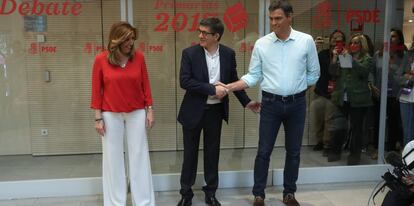Candidate debate highlights deep divisions within Spain’s Socialist Party
Susana Díaz, Pedro Sánchez and Patxi López blame one another for PSOE’s ongoing crisis
Eight consecutive months of internal confrontation within the Spanish Socialist Party (PSOE) – triggered by the resignation on October 1 of its secretary general, Pedro Sánchez – climaxed on Monday with a three-way debate between the candidates who hope to fill the position at a vote this coming Sunday.

On May 21, 187,000 card-holding members will decide whether Susana Díaz, Pedro Sánchez or Patxi López get to lead a deeply divided party whose fracture lines were evidenced at the debate, held at party headquarters in Madrid.
The leading candidate in the race, Susana Díaz, who currently serves as the premier of the populous southern Spanish region of Andalusia – traditionally a PSOE power base – laid the blame for the party’s continuing crisis squarely on Pedro Sánchez, who is hoping to get his old job back and recently surprised political analysts by securing enough party endorsements to become the second strongest contender.
Susana, I hope you will acknowledge that abstaining was the worst of all possible decisions
Pedro Sánchez
Díaz, who is focusing on Sánchez as the rival to beat, said that his constant “swerving” on the issues while party secretary was the cause of the PSOE’s back-to-back defeats at two general elections held in Spain: one was held on December 20, 2015, when emerging protest parties Podemos and Ciudadanos gained a congressional presence and the Socialists lost 20 deputies, representing their worst electoral result in Spain’s democratic history. A repeat election was held on June 26, 2016 to try to break the deadlock, and the PSOE fared even worse, losing a further five seats.

With Spanish politics in a stalemate and a third election on the horizon, PSOE leaders decided to stop blocking the interim prime minister, Mariano Rajoy of the Popular Party (PP) conservatives, from being reinstated to a new term in office. Sánchez opposed such a move, but his views were overruled and he resigned. The party has been led by a temporary management team ever since.
“Pedro, the problem is you,” said Díaz on Monday, accusing her rival of lacking a clear project. “I don’t think you are pro-Podemos or pro-Ciudadanos: you are pro-Pedro Sánchez and you do whatever is in your own best interest.”
Sánchez, for his part, blamed Díaz for supporting the PSOE’s decision to abstain at Rajoy’s reinstatement vote in Congress, portraying this move as a betrayal that the party grassroots have neither forgiven nor forgotten.
“Susana, I hope you will acknowledge that abstaining was the worst of all possible decisions,” he told her.
Pedro, the problem is you
Susana Díaz
Besides attacking one another, both nominees also made campaign promises. “If the PSOE, with me at the helm, does not do better at the polls, I will leave; I will not lay the responsibility at anyone else’s feet,” said Díaz. And Sánchez announced that “if I am secretary general, my first measure will be to demand the resignation of Mariano Rajoy.”
The third candidate in the running, former Basque premier and ex-congressional speaker Patxi López, accused both his rivals of helping create a rift within Spain’s socialists, and warned that the PSOE “runs the risk of disappearing” if Sánchez and Díaz keep this up.
English version by Susana Urra.
Tu suscripción se está usando en otro dispositivo
¿Quieres añadir otro usuario a tu suscripción?
Si continúas leyendo en este dispositivo, no se podrá leer en el otro.
FlechaTu suscripción se está usando en otro dispositivo y solo puedes acceder a EL PAÍS desde un dispositivo a la vez.
Si quieres compartir tu cuenta, cambia tu suscripción a la modalidad Premium, así podrás añadir otro usuario. Cada uno accederá con su propia cuenta de email, lo que os permitirá personalizar vuestra experiencia en EL PAÍS.
¿Tienes una suscripción de empresa? Accede aquí para contratar más cuentas.
En el caso de no saber quién está usando tu cuenta, te recomendamos cambiar tu contraseña aquí.
Si decides continuar compartiendo tu cuenta, este mensaje se mostrará en tu dispositivo y en el de la otra persona que está usando tu cuenta de forma indefinida, afectando a tu experiencia de lectura. Puedes consultar aquí los términos y condiciones de la suscripción digital.









































